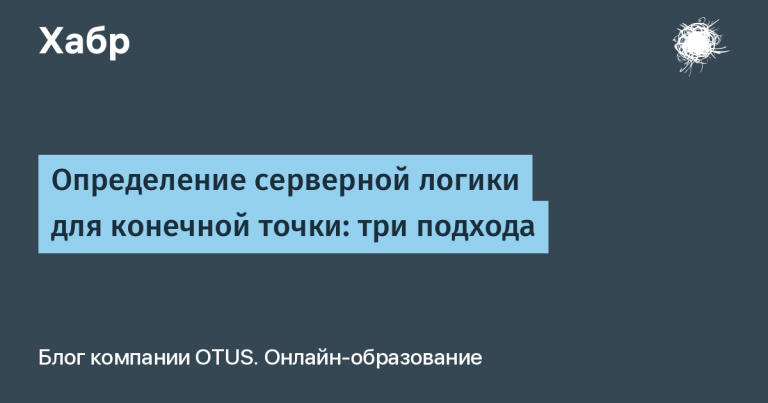If intelligence is a mental disorder, then what is artificial intelligence?
Not long ago I was very impressed by the article Man, death & ethics and I really wanted to see a continuation of this topic.
But it seems to me that before dealing with the “concepts of defining a person, morality and ethics” in relation to Artificial Intelligence, it would not be a bad idea to first understand the understanding of artificial intelligence itself and simply intelligence. Let's try to speculate on this topic. First, I’ll try to bring you to the question from the title.
You know the feeling when you follow some process and it fascinates you and doesn’t let you tear yourself away. It’s as if you become part of this process and dissolve in it…
Remember: you can endlessly watch how water flows, how fire burns, … there are many things that you can endlessly watch.
What attracts us and makes us dissolve in such processes? We are probably struck by some incomprehensible, unreal manifestation and combination of ordinary laws of nature, the laws of the universe, the play of the most familiar, most natural combinations and transformations of entities.
At such moments, you actually look inside yourself, you enjoy the reflection of reality in the world of your own intellect, and the images of your mind begin to play after the entities that you observe in the real world. It seems to me that it is the play of this display that fascinates us.
His intellect is like a child with big eyes who wants to play, who is interested in everything.
Intelligence is a world that grows, reflecting the reality with which it comes into contact and in which it exists. The intellect needs to become part of the real world, get to the essence of things, to the essence of the changes and transformations taking place, learn to predict them, and then, if possible, manage them.
Like a child who wants to be like his parents, the intellect seeks harmony, which is subject to the existence of the external world, the existence of its carrier, and strives to repeat it, make it a part of itself or become a part of it.
The intellect constantly carries on a conversation with itself or with its carrier, and the carrier can damage the intellect, force it to obey emotions, passions, dogmas, even reflexes. Anything that limits intelligence sooner or later kills intelligence.
The intellect is confident in its knowledge. He is ready to defend it, prove it and defend it in every possible way, and at the same time he is ready to correct or deeply revise this knowledge in order to resolve the accumulated contradictions – mapping errors from the real world, to take into account previously missed facts. Intelligence is actually an independent entity. We can talk about the intelligence of humanity, the intelligence of the people, we can even consider the intelligence of an idle company aimed at developing a festive atmosphere and festive mood of its members.
Intelligence is capable of developing itself in isolation from reality; in this case, the result of its development is not predictable and it is unlikely to lead to anything good. In essence, the dogmatic way of thinking is actually the isolation of the intellect from reality and its closure on a limited basis of strictly defined dogmas; at the same time, the bearer is also forced to limit his ability to analyze external events and processes and perceive them only from the side from which they fit into given basis. Oddly enough, with this approach, the intellect is not left without work and obediently carries out the tasks set by its carrier, pushing the incoming flow of information into the allotted framework, but this is very difficult work, which is very harmful to the intellect in any case and leads to its degeneration into something bad .
Intelligence asks questions, but what is much more important, it selects the correct formulations of questions that have already been asked. The intellect formulates a question, it searches, selects, formulates an answer, and then analyzes the question-answer composition. With such an analysis, the intellect makes sure that some currently known harmony (or what should we call it?) is not violated, that many question-answer pairs fit into a single picture, that this overall picture does not lose touch with reality, that questions do not end, that questions made it possible to penetrate deeper into the structure of the universe, so that all the growing knowledge would bring satisfaction or simply benefit to the bearer of the intellect.
Can Artificial Intelligence Ask Questions? It seems like it can. But can AI ask questions of itself? I think not! It simply has to save energy.
But if he cannot ask himself questions, that is, conduct independent reasoning, then, in general, Artificial Intelligence is not intelligence. We see that for him the way of existence that defines the essence of the concept of “intelligence” is violated; he is not self-sufficient, he has no goal within himself.
But we cannot say that Artificial Intelligence does not exist; some entity under that name is widely used and is being fully developed. It's just that the word “intelligence” in this title clearly has a meaning that is very different from the original one.
But we can consider the concept of Artificial Intelligence from the other side. Remember, we said that real intellect is confident in its knowledge, it is ready to defend, prove, defend this knowledge in every possible way, moreover, it can be argued that it is the intellect that forces the bearer to act in accordance with this knowledge, to the point of even sacrificing themselves (remember the legend about Copernicus, or is it not a legend?) defending their knowledge.
And now let's think about whether it is possible to say that Artificial Intelligence in the same sense is confident in its knowledge, confident that it answers you? As far as I understand, there can be no talk of any certainty there. The AI is not only indifferent to the answer it gives you, it can easily give you a completely different answer to almost the same question. We simply receive answers that, with some probability, are similar to a possible standard answer, and a standard one from the point of view of some algorithm.
After all, we have all been in a situation more than once when we asked a question, but the answer does not suit us at all, and we understand that the question was not correctly understood and we ask the same question in a different wording, ask again and again until we achieve understanding. It seems to me that in such a situation, the intelligence is definitely possessed by the party that is able to change and select the wording of the question, and analyze the answer for adequacy and compliance with the question posed. The intelligence of the responding party could probably also be judged by the ability to formulate clarifying questions, although one would have to take into account the same consistency and adequacy and the non-monosyllabic nature of such clarifying questions. You didn't have to question yourself; and answer them; then apply the answer with the question to reality, find flaws, contradictions, correct the answer, perhaps correct the question, repeat everything in a circle over and over again until everything comes together? When you write programs that should work, this is a common routine.
In any case, an obvious manifestation of intelligence is the ability not just to answer questions, but to analyze the correspondence of meaning from the question and from the answer and the ability to defend one’s point of view (the ability to demonstrate confidence in one’s knowledge).
Probably the conclusion that I would draw after such reasoning is that, if we simply take as a basis that intelligence is in some approximation similar to a mental disorder – it is simply the ability to talk to oneself and decide something with oneself , then it turns out that intelligence, generally speaking, is not obliged to manifest itself in the outside world, it is completely determined by a closed process that occurs inside the carrier; one can only indirectly judge the presence of such a process inside the carrier, be it a living being or a machine.
It is possible to unambiguously determine that someone or something has intelligence only if this someone/something does not intend to hide the presence of such a process within itself, and it is even possible that intelligence is determined only if the bearer of this intelligence definitely wants to show off his intelligence.
Here, by the way, we can remember that most people are predisposed to demonstrate their intelligence in its best (although sometimes in its worst, unfortunately) manifestations. Upon closer examination, I think it is obvious to everyone how this is connected with the same quality of intelligence to protect, in this case, through dissemination among as many individuals as possible, one’s knowledge, which in turn provides additional clarification and verification and even expansion of this knowledge.
That's all for now.





